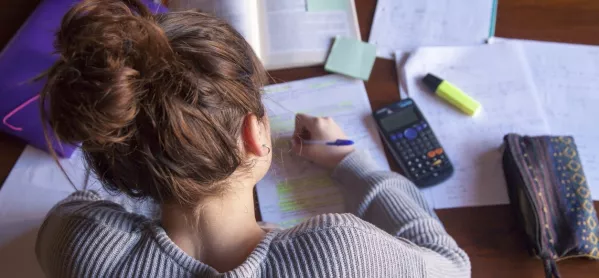
Revealed: How lockdown has hit learning

Pupils spent less time on their schoolwork the longer they were out of class during the first lockdown - and children from poorer families were less likely to return to school at the earliest opportunity, an influential think tank is reporting.
Children from well-off backgrounds were more likely to take up the offer to return to class than their more disadvantaged peers when schools began to reopen last year, an Institute for Fiscal Studies (IFS) analysis has found.
Researchers say a full return to school should be prioritised as they say a voluntary return could further widen the gaps between poorer pupils and their peers.
GCSEs 2021: Silence on the biggest injustice of all
Analysis: Will Covid rates be safe for 8 March opening?
News: Covid test plans for school return ‘work in progress’
Targeted support for disadvantaged pupils will be needed to help them catch up with their learning even if school attendance is compulsory, they add.
Primary school children in England who were not offered the chance to return to school in June last year spent around three and a half hours a day learning in the summer term - which is 15 per cent less than at the start of the lockdown, according to the IFS report, which was funded by the Nuffield Foundation.
Secondary school students saw their learning time fall even faster over the period they were out of school - with the majority of year groups not returning to class until September after schools closed their doors in March last year.
Children from better-off families in England spent more time learning at home than their disadvantaged peers, and they also increased their learning time by more when they returned to the classroom, according to the report.
Once schools started to reopen in June last year, pupils from better-off families were far more (50 per cent) likely to take up the offer to return to school than their more disadvantaged peers, the paper says.
Among primary school children offered the chance to return, more than half (56 per cent) of those in the poorest fifth of families went back to the classroom, compared with 83 per cent of those in the richest fifth, according to the report which looked at data collected during last spring and summer.
Among poorer families, the primary concerns with returning to school last summer were health risks to the child, health risks to the wider family and a reluctance to be the first to go back.
At the start of June, pupils in England in Reception, Year 1 and Year 6 were allowed to return to the class, while secondary school pupils in exam years were offered some contact time from mid-June.
Ahead of prime minister Boris Johnson’s announcement on schools reopening next week, the researchers have warned that a phased return to school next month will likely widen the gaps between children in different year groups.
Christine Farquharson, a senior research economist at IFS, suggested that decisions about how schools reopen are “tougher” than decisions about when.
She said: “Prioritising certain year groups widens the gaps between children of different ages. A voluntary return to school from 8 March risks widening inequalities further if the poorest children stay home while their better-off peers choose to return to the classroom.”
Josh Hillman, director of education at the Nuffield Foundation, said: “The fact that children from poorer families were less likely to return to school at the earliest opportunity last year, and in many cases were less able to engage with remote schooling, reinforces the need for sustained and targeted support for those pupils when they do return.
“Realistically, many parents will delay sending their children back to school whatever the policy is on prioritising particular groups for a return to the classroom, and that will increase the learning gap in the summer term and into the next school year.”
A Department for Education spokesperson said: “We recognise that extended partial school closures have had an impact on all students’ education and the prime minister is due to set out plans for schools reopening on 22 February - pupils will return from 8 March at the earliest.
“Our £1 billion Covid catch-up package is tackling the impact of lost teaching time, including a £650 million catch-up premium for schools to use in the best interests of all their students and a £350 million National Tutoring Programme for disadvantaged pupils.
“We are also investing a further £300 million in additional tutoring programmes, and have just appointed Sir Kevan Collins to the role of Education Recovery Commissioner, in recognition that a long-term plan is required to make sure pupils have the chance to make up their lost education over the course of this parliament.”
You need a Tes subscription to read this article
Subscribe now to read this article and get other subscriber-only content:
- Unlimited access to all Tes magazine content
- Exclusive subscriber-only stories
- Award-winning email newsletters
- Unlimited access to all Tes magazine content
- Exclusive subscriber-only stories
- Award-winning email newsletters
You need a subscription to read this article
Subscribe now to read this article and get other subscriber-only content, including:
- Unlimited access to all Tes magazine content
- Exclusive subscriber-only stories
- Award-winning email newsletters
- Unlimited access to all Tes magazine content
- Exclusive subscriber-only stories
- Award-winning email newsletters



